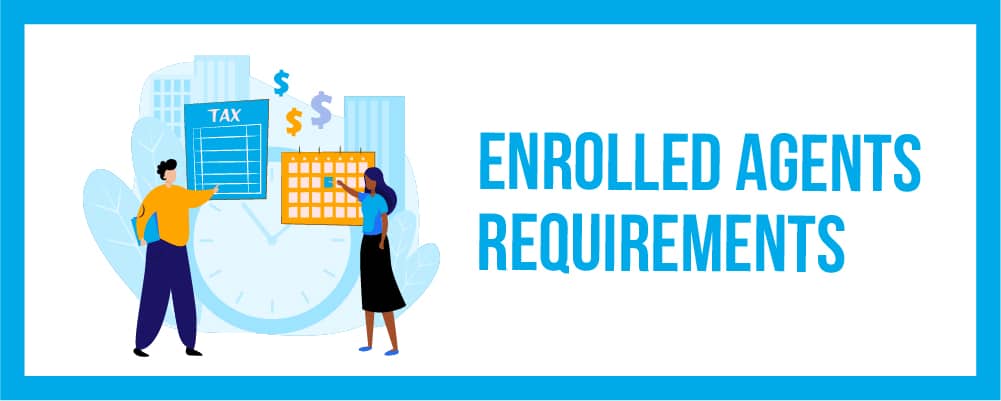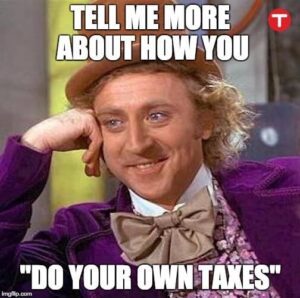
A few essential requirements for becoming an enrolled agent include obtaining a preparer tax identification number, completing the Internal Revenue Service Special Enrollment Exam, and sending in an application to practice before the IRS.
Today, you take the first step to earning the title of “Enrolled Agent,” and we’re going to help you get there.
If you’re ready for this mission, keep reading. You’ll learn which requirements you’ll need to meet and how you can make it to the finish line without breaking a sweat.
Enrolled Agent Requirements
Preparer Tax Identification Number
The first thing you’ll need to become an enrolled agent is a Preparer Tax Identification Number. (PTIN) This number registers you in the IRS database so your enrolled status can be easily verified.
You’ll need to prepare several pieces of personal information to apply for your PTIN. Here’s a quick rundown:
- Social Security Number
- Personal & business information (name, address, contact)
- Previous year’s tax returns
- Felony conviction explanation (if applicable)
- An explanation for issues with personal or business tax (if applicable)
- Payment method for $30.75 PTIN issuance fee
- Certification details (i.e., Certified Public Accountants), if any
It’s important to note that discrepancies in personal or business tax returns and certain parts of your criminal background can prohibit you from obtaining a PTIN. For example, suppose you have any criminal background related to federal tax laws, dishonesty, or breach of trust. In that case, you must wait ten years before becoming eligible to become an enrolled agent.
You’re also prohibited from obtaining a PTIN if you have an Individual Taxpayer Identification Number (ITIN) unless you are a foreign person with a permanent non-U.S. address and have the documentation to prove it.
After completing the online application using the above details, you’ll be directed to the IRS’ partner bank to process the PTIN issuance fee. Then, you’ll be automatically issued your unique number.
Remember to keep this number in a safe place – you’ll need it later.
Internal Revenue Service Special Enrollment Examination
Before you can represent taxpayers as an IRS-enrolled agent, you’ll first need to pass the Special Enrollment Exam (SEE exam). This three-part exam is a comprehensive test designed to measure your understanding of the fundamentals of representing taxpayers.
The three sections of the SEE exam are as follows:
- Individuals
- Businesses
- Representation, Practices, and Procedures

You’ll need to earn a passing score on all three sections of the SEE exam, even if you only plan to represent one of the two classes of clients.
Registering to take the SEE exam is easy. Simply create an account, review the Candidate Information Bulletin, and schedule your examination appointment at the Prometric testing center.
Think you know it all?
Not so fast…
Before scheduling your exam, however, it’s vital to ensure you’re fully prepared to achieve passing scores.
Let’s dig a little deeper.
Preparing for the Special Enrollment Exam
Achieving a passing score on the IRS Special Enrollment Examination is your ticket to a recession-proof career.
The secret to crushing the SEE Exam? Proper preparation. Let’s dive in.
Focus on Enrolled Agents Fundamentals
Perhaps the biggest mistake that many enrolled agent hopefuls make is simple: overthinking the exam. The #1 most important thing you need to do to earn a passing score is simple: master the fundamentals.
Sound too good to be true? Let’s break it down.
The SEE exam is designed to ensure enrolled agents have a basic understanding of the most common tax issues. Though some advanced topics might appear on the test, you have a greater chance of passing by focusing on the basics.
Memorize Basic Tax Formulas
It’s no secret that representing taxpayers requires a lot of math. You’ll need to know basic tax formulas to serve your clientele properly. Consequently, you’ll need to commit basic tax formulas to memory.

Know What to Expect on Test Day
The last thing you want is surprises on test day. But on the other hand, not knowing what to expect can lead to unnecessary stress, negatively impacting scaled scores, and more.
Prometric takes the safety of their staff and test takers extremely seriously. As a result, you’ll be expected to complete security measures such as providing identification and fingerprints.
To learn more about what to expect on test day, check out Prometric’s information page.
Sharpen Your Test-Taking Strategy
At its core, the EA exam is not unlike other tests you’ve taken in the past. Therefore, brushing up on good test-taking strategies, such as spending less time on one question, is a good idea.
Since you can skip questions on the Enrolled Agent Exam, you can safely save the more time-consuming questions for last. This allows you to get through the brunt of the test without wasting too much time on difficult questions.
Above all, remember to maintain a positive attitude throughout the testing window. There’s no doubt that obtaining an EA certification can be stressful, but with the right mindset, you can achieve your goals.
Enroll in a Review Course
One of the most effective ways to properly prepare for the EA exam is by enrolling in an enrolled agent review course. These courses are designed to help you gain the knowledge you need to pass the EA exam on your first attempt.
Still trying to figure out where to start? A few of our favorite EA review courses include Becker, Surgent, and Wiley.
Not sure what the look for in a good EA review course? Here are a few key features to look for:
- Practice exams
- Tax law, tax code, and tax compliance information
- Business tax preparation courses
- Individual tax preparation courses
Complete the Application for Enrollment to Practice Before the Internal Revenue Service

The next crucial step to earning your EA credential is applying to practice before the IRS. Here’s what that consists of:
- Completed Form 23
- Details regarding formal education, licenses, and credentials
- Application fee of $140
The IRS will consider all parts of your application before deciding if you’re eligible to become an enrolled agent. However, the entire process can take up to 60 days to complete.
Pass a Suitability Check
Before your Application for Enrollment to Practice Before the Internal Revenue Service can be approved, you’ll need to pass a suitability check. This process consists of checking to ensure you have no outstanding tax liabilities.
During this process, the IRS offices will also check to ensure that there are no inconsistencies in your personal or business tax returns. Enrolled agents must abide by tax laws, which means you must file tax returns according to the tax code.
Some of the most prominent reasons why individuals don’t pass a suitability check include missing tax returns and outstanding tax liabilities that are not covered under a payment arrangement approved by the federal government.
Enrolled Agent FAQ
What is an enrolled agent?
An enrolled agent is an individual who is certified to represent taxpayers before the Internal Revenue Service. Some examples of enrolled agents include certified public accountants and lawyers.
How long does it take to become an enrolled agent?
Depending on your level of tax knowledge in the beginning stages of becoming an enrolled agent, the process can take anywhere from three to eight months to complete. However, activities such as completing an EA review course can help shorten this timeframe.
Do enrolled agents have to meet any continuing education requirements?
All enrolled agents must complete a minimum of 16 hours per year in continuing education efforts. Two of these hours must regard ethics.
The Bottom Line
Becoming an enrolled agent is a somewhat lengthy process that can take anywhere from three to eight months to complete. However, understanding the requirements for becoming an enrolled agent can help you master the process and earn your certification as quickly as possible. In addition, taking initiatives like completing an EA review course can help you reduce the amount of time you’ll have to wait to be granted your certification.
Resources:
Bryce Welker is a regular public speaker and contributor to several online publications, including Forbes, Inc.com, and Entreprenuer.com. Bryce earned his CPA license and went on to become mastermind behind over twenty different websites devoted to providing people like you with the resources necessary to successfully pass certification examinations.
